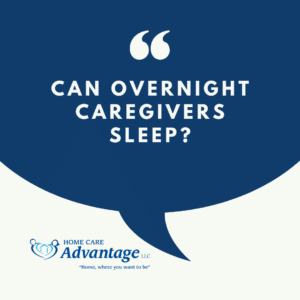Can Overnight Caregivers Sleep?

When you retain an overnight home care service through an agency like Home Care Advantage, LLC, you usually have a reason for doing so, the most obvious of which is that you require assistance with an aging parent or senior loved one.
While an overnight caregiver’s primary role is to address your parent’s needs, they can also perform ordinary household activities while the parent is sleeping.
In general, overnight caretakers do not sleep. Instead, they assist with responsibilities such as light housekeeping, laundry, and nighttime restroom visits. The primary purpose for hiring a caregiver for an aging loved one is to allow you to obtain some much-needed rest.
The nighttime caregiver typically spends between eight and twelve hours in your home, from late evening to the morning hours.
Your needs and those of your parents will indicate whether you require temporary or long-term nighttime assistance.
The following are the most prevalent reasons for seeking assistance for an aging loved one:
- A significant medical condition: If your parent or family member has a medical condition that necessitates continual monitoring, an overnight caregiver can keep an eye on them while you sleep.
- Memory problems: As your parents get older, memory lapses become increasingly typical. Having an overnight caregiver protects them from leaving the house unnoticed, as well as from potential harm due to unaccompanied night wanderings.
- Recovery from surgery: When a parent has a surgical procedure and is released from the hospital, the recovery period might be long. A nighttime caregiver can fill the need left by evening care, allowing you to have the rest you need to perform successfully throughout the day.
- Limited mobility: Older folks do not sleep as much as younger people because they must get up multiple times during the night to use the restroom. They may experience insomnia and require the assistance of a walker, wheelchair, or cane to get around. If a parent is left alone, they may try to get out of bed during the night and fall, potentially causing serious injury to themselves.
- Preventing falls: Because they might be disoriented when they wake, aging parents are at a higher danger of falling at night. Knowing that a nighttime caregiver is there to help them can put your mind at ease.
- Light housekeeping: Some nightly care providers will delegate light housekeeping responsibilities to their staff while the parent sleeps. This could include laundering and putting away clothes as well as cleaning the restroom.
If you or an aging loved one in Danbury, Connecticut are considering home care, please call the friendly and professional staff at Home Care Advantage, LLC today.


